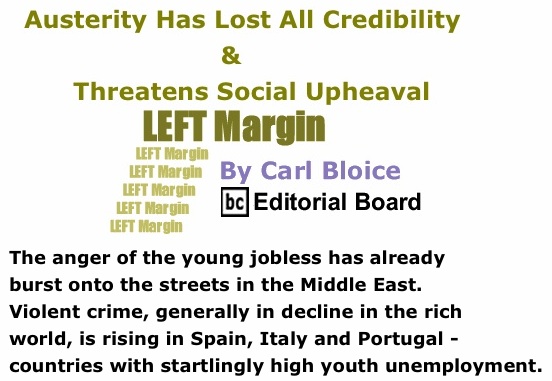


When Michael Higgins, the president of Ireland, finished
speaking he received a standing ovation from members of the European
Parliament. In a stirring April 17 address to the delegates meeting in
Strasbourg, he said the continent’s policy makers must not “ignore the
fact that European citizens are suffering the consequences of actions
and opinions of bodies such as rating agencies, which, unlike
parliaments, are unaccountable.”
“Many of our citizens in Europe regard the response to the crisis in
their lives as disparate, sometimes delayed, not equal to the urgency
of the task and showing insufficient solidarity with them in their
threatened or actual economic circumstances,” Higgins, a left-leaning
poet, sociologist, author and broadcaster who holds the largely
ceremonial post as his country head of state, continued. “They feel
that in general terms the economic narrative of recent years has been
driven by dry technical concerns; for example, by calculations that are
abstract and not drawn from real problems, geared primarily by a
consideration of the impact of such measures on speculative markets,
rather than driven by sufficient compassion and empathy with the
predicament of European citizens who are members of a union, and for
whom all of the resources of Europe’s capacity, political, social,
economic and intellectual might have been drawn on, driven by the
binding moral spirit of a union.”
Last week, Higgins said pretty much the same thing to the
Financial Times, which said he told Dublin correspondent, Jamie Smyth
the European Union “risked social upheaval and losing popular
legitimacy” unless it changed course. He called for “radical economics”
and a “radical rethink” of how to deal with the current economic crisis.
Higgins’ views stirred a political hornet’s nest in Ireland. When a
Sinn Fein delegate brought up his remarks the lower house of parliament
(the Dail) the day the interview appeared, the parliamentary speaker
ruled such a discussion out of order.
Higgins’ expression appears to have gone over well in Ireland, however
and reflects a growing sentiment in Europe that by continuing on the
present path of fiscal austerity and failure to confront the problem of
joblessness raises the specter of social upheaval.
“There is a sense of foreboding in the region” Financial Times correspondent Komal Sri-Kumar wrote April 30.
"Socially and politically, one policy that is only seen as austerity
is, of course, not sustainable," the president of the European
commission Jose Manuel Barroso said recently. "We haven't done
everything right … The policy has reached its limits because it has to
have a minimum of political and social support."
Olli Rehn, the E.U. commissioner for economic and monetary affairs,
issued a statement last month calling on the union’s leaders to “do
whatever it takes to overcome the unemployment crisis.’
Meanwhile, the Economist reported April 27 that “more young people are
idle than ever,’ citing statistic that show 26 million 15-to
-24-year-olds in developed countries are idle and the number of young
people without a job has risen by 30 percent over the past five years
and across the planet 75 million young people are seeking work.
“Depending on how you measure them, the number of young people without
a job is nearly as large as the population of America,” said the
magazine.
“The result is an ‘arc of unemployment’, from southern Europe through
north Africa and the Middle East to South Asia, where the rich world’s
recession meets the poor world’s youthquake,’ said The Economist. “The
anger of the young jobless has already burst onto the streets in the
Middle East. Violent crime, generally in decline in the rich world, is
rising in Spain, Italy and Portugal - countries with startlingly high
youth unemployment.”
“It is difficult to be festive when 26m Europeans are jobless and
economic recession blights the continent,’ Tony Barber wrote in the
Financial Times last month. “For the first time in generations,
numerous parents fear that the future living standards of their
children will be lower than their own. Their sense of powerlessness is
all the greater because, in or out of government, Europe’s centre-left
parties – once the formidable political voice of the organized working
classes – no longer appear capable of fulfilling their historical
mission as protectors of jobs, welfare and social cohesion.”
“Our task is to continue with policies of fiscal consolidation and
keeping public accounts in order,” he said. But, he added, it was
“absolutely necessary” to foster growth and job creation “so that our
citizens see Europe not as something negative but as something
positive,” Italy’s new Prime Minister Enrico Letta said last week.
“Politics has lost all its credibility. Either we regain it, everyone
and together, or there cannot be the instruments to resolve the
country’s problems.”
“Seemingly endless recession and truly catastrophic levels of
unemployment are fostering distrust, despair and a rise in political
extremism,” the British daily Independent observed on May Day.
“Joblessness is soaring in recession-mired Italy, and a series of
suicides linked to the economic crisis have hit the headlines in recent
months.”
Meanwhile here at home, the April U.S. employment statistics came out
last week. For the most part little changed over the month. On the jobs
front the country is treading water.
The figures released by the Labor Department “means there were enough
jobs to keep the unemployment rate stable, but not much more,” says
analyst Heidi Shierholz of the Economic Policy Institute. “While this
report would be fine in good times, at a time of persistent economic
weakness, it represents an ongoing disaster.”
“The American economy continues to add jobs in proportion to population
growth. Nothing less, nothing more,’ observed Binyamin Appelbaum in the
New York Times,’ adding that the country’s economy “is not getting any
closer to recreating the jobs lost during the recession.”
“Despite more than three years of job growth, the labor market still
has a deficit of 8.7 million jobs, and the lack of demand for workers
means unemployment remains high, labor force participation is low, and
wage growth for people with jobs is sluggish,” says Shierholz.
The April jobless rate for African Americans was 13.2 percent,
practically unchanged from 13.3 percent in March. According to Steven
Pitts of the University of California Labor Center, “For the nation as
a whole, unemployment was 7.5 percent in the month of April; this was
virtually unchanged from March when the national unemployment rate
stood at 7.6 percent. Among whites, unemployment was 6.7 percent; among
Latinos, unemployment was 9.0 percent. Comparable March 2013 figures
were 6.7 percent and 9.2 percent respectively.”
In keeping with the usual pattern, the group taking the
biggest hit on the jobs front is African Americans between 16 and 19
years old. For them the unemployment rate in April was 40.5 percent, up
from 33.8 percent in March for Black female teens, unemployment stood
at 37.6 percent, up from 30.9 percent in March). For young black males
the unemployment rate was 44.7 percent up from 37.1 % in March.
As Pitts notes, “teen unemployment rates are extremely volatile from
month to month.” Yet, it is clear that the catastrophic employment
situation for young African Americans shows no sign of improvement.
Over 20 percent of 18-29-year-old African Americans are without a job.
Just in case there was an impression that the May Day appeal by Pope
Francis to “give new impetus to employment,” was applicable only to
Europe consider this from David Leonhardt of the New York Times May 3:
The U.S. “has quietly surpassed much of Europe in the percentage of
young adults without jobs. It’s not just Europe, either. Over the last
12 years, the United States has gone from having the highest share of
employed 25- to 34-year-olds among large, wealthy economies to having
among the lowest.”
Would it really be easy to end “the scourge of unemployment?” in the
U.S. economist Paul Krugman asked March 30. “Yes — but powerful people
don’t want to believe it. Some of them have a visceral sense that
suffering is good, that we must pay a price for past sins (even if the
sinners then and the sufferers now are very different groups of
people). Some of them see the crisis as an opportunity to dismantle the
social safety net. And just about everyone in the policy elite takes
cues from a wealthy minority that isn’t actually feeling much pain.”
“The Class of 2013 will graduate into a labor market that is still very
weak,” observed Shierholz. “As discussions take place this spring about
what to do for these young workers entering a dire labor market, it is
important to note that although young workers are a unique group, their
currently high unemployment levels do not require a unique solution.
The thing that will bring down the unemployment rate of young workers
most quickly and effectively is strong job growth overall. Focusing on
policies that will generate demand for U.S. goods and services (and
therefore demand for workers who provide them) - policies such as
fiscal relief to states and substantial additional investment in
infrastructure - is the key to giving young people a fighting chance as
they enter the labor market during the aftermath of the Great
Recession. This would require policymakers to prioritize job creation
over deficit reduction.”
“Over 20 million people are in need of full-time work,” wrote
Robert Borosage of the Campaign for America’s Future May 3. “Thirty
seven percent of the officially unemployed have been out of work for
more than 27 weeks. Wages of those who are working are not
keeping up with prices. Families are losing their homes.
Marriages break under the strain. The young are idled; their
hopes crushed. Americans are paying a terrible price for
Washington’s folly.”
“A first and urgent task must be to get Europe back to sustainable and
fulfilling employment and a return to real growth,” the Irish poet said
to the EU Parliament. “There is nothing more corrosive to society and
more crushing to an individual than endemic unemployment, particularly
among the young. Today there are 26 million people across the Union
without work, 5.7 million young people, and 115 million in or at risk
of poverty and social exclusion. We cannot allow this to continue.”

BlackCommentator.com Editorial Board member and Columnist Carl
Bloice is a writer in





